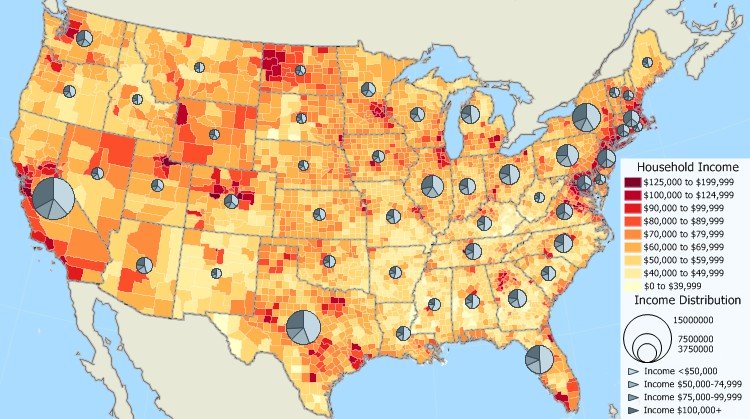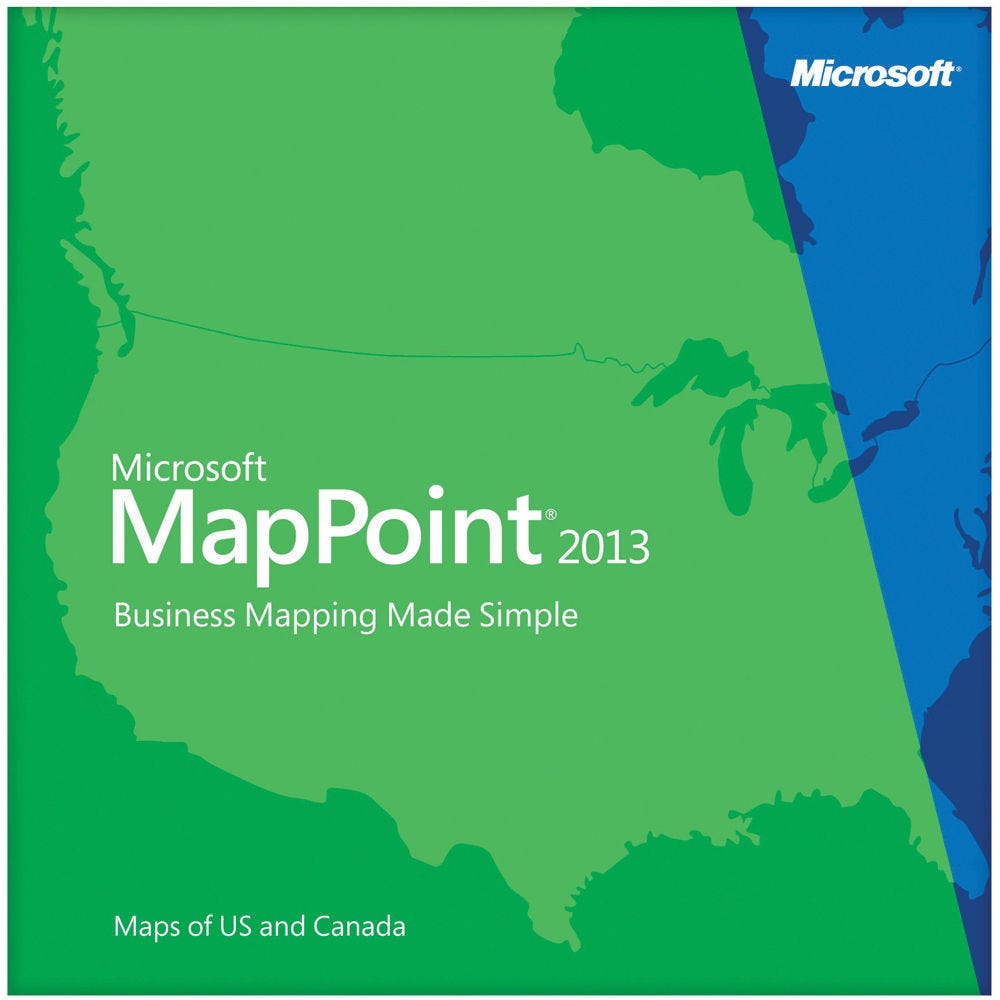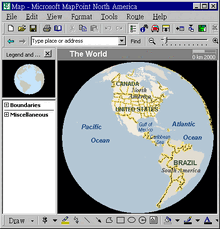Remember the peaceful days of the floppy disk?
MapPoint(Double, Double, Double) Initializes a new instance of the MapPoint class with an x, y, z and a null spatial reference. MapPoint(Double, Double, Double, SpatialReference). Microsoft MapPoint is a discontinued software program and service created by Microsoft that allows users to view, edit and integrate maps. The software and technology are designed to facilitate the geographical visualization and analysis of either included data or custom data. Microsoft MapPoint, originally released in 2000, was a popular data mapping software for businesses. In 2015, Microsoft stopped supporting the platform, leaving users searching for a MapPoint replacement to help them visualize their data. Microsoft MapPoint is a discontinued software program and service created by Microsoft that allows users to view, edit and integrate maps. The software and technology are designed to facilitate the geographical visualization and analysis of either included data or custom data.
For some, that era is already ancient history, having grown up in the internet and cell phone age. Still, there are many working in sales who can still recall the challenges of doing outside sales without the modern convenience of accessible GPS mapping.
Think for just a second about how you’d try to find someone nowadays with nothing more than an address to go off of. Now imagine trying to plan your entire day around a series of these addresses — all without the benefit of Waze, Google Maps, or anything else smartphone-related.
Tough, right? Yet that was exactly the problem facing most outside salespeople before smartphones became widespread. Or at least, it was the problem people faced before Microsoft MapPoint was released.
Started by 5 friends in a garage in Esher, a small town in Surrey, England, Microsoft MapPoint was a massive hit almost as soon as it was released. As far as virality went back then, MapPoint went viral — at one point, half the computers in the United Kingdom were running it . Before long, it became one of the best-selling consumer applications in the market.
Then on one day in 2014, it disappeared from the world.
Why did one of the biggest and best selling consumer softwares exit the scene as suddenly as it arrived? And, more importantly, what alternatives are salespeople supposed to use now?
History of Microsoft MapPoint
In 1988, Mark Atherton and Ian Mercer started building the product that would later become MapPoint.
To facilitate the process, the team started a company called NextBase Limited, which focused on creating digital maps. The team was entirely self-funded, and the founders often took outside jobs in order to supplement their income while they worked.
During the late ’80s, most software programs were totally text-based. However, the NextBase team wanted to stand out from the marketplace as much as possible — so they focused on the visual instead.
After over seven months of coding, the crew managed to get together a working copy which team members then distributed to journalists. The press loved it — nobody had ever seen graphics in software quite like this. So it made sense that, after receiving rave reviews from the media, MapPoint quickly blew up.
According to this New York Times article, MapPoint sold over 400,000 copies, making its mark as the top-selling consumer application on the market.
What Was Microsoft MapPoint?
Microsoft MapPoint was a mapping software that allowed its users to view, edit, and manipulate maps using custom data, and then analyze it visually. It might not have been as slick as Google Maps is now, but it made up for it by being early and having a lot of features that even a lot of today’s GPS programs don’t offer.
Priced with an account fee of $250, some of those features included:
- One of the first GPS systems
- Trip planning tools
- The ability to visualize territories
- Territory reports
- Mileage, drive times, and expenses calculators
- The ability to export digital images
- The ability to combine business data with demographics to find and target potential customers, and focus your business decisions.
This was all groundbreaking back when MapPoint was released. At the time, digital maps and GPS were largely unheard of outside of science fiction.
Is Microsoft MapPoint Still Available?
No — although the software still exists on devices across the world, there hasn’t been an update released since 2013, and the support lines were stopped in 2015. Here’s what happened:
Microsoft ended up buying NextBase, at which point the NextBase team moved from England to the United States. For a while, things remained good for MapPoint. Other softwares continued to grow in the consumer sector, but MapPoint remained the preferred tool of enterprise sales.
In 2013, Microsoft was pouring resources into Bing, largely due to an ongoing arms race it was in with Google. It was Microsoft’s hope that Bing Maps would eventually compete with Google Maps, which hasn’t exactly panned out so far.
At the end, MapPoint released a goodbye message urging their customers to use Bing Maps instead. But Microsoft made the mistake of tailoring Bing Maps to everyone, and — as a result — they lost sight of the business market that MapPoint had once held.
Can Microsoft MapPoint be replaced?
Yes — in 2016 we built Map My Customers to replicate the best of what MapPoint had to offer, while adding in modern features that make it mobile-friendly and super insightful.
Most sales teams had wound up resorting to free mapping softwares like Google Maps and manually entering each data point themselves.
This led to a lot of frustrated customers, including (of course) ourselves...
It was 2015, and we were stuck running our sales routes like it was 1988. It was inefficient, boring, and in the end — it just didn’t make any sense.
That’s why we created a new software that does everything (and more) of what Microsoft MapPoint was capable of:
- Customer Visualization — Visualize sales opportunities and customers displayed as clickable pins on a map
- Route Optimization — Reduce planning and travel time with our leading routing algorithms
- Sales Planning and Contact Management — Log activities like cold calls and meetings, track check-ins and sync it all to your calendar
- Territory Management — Visualize, draw, and manipulate sales territories on the map
- Reporting and Team Management — Track rep activity and surface sales data unique to the field
Unlike Microsoft MapPoint, MMC is built for the phone — meaning you can see your routes, schedule and customer notes from anywhere. On the web, we have dashboards to organize and analyze your team’s data and easily transfer data between team members or your CRM — all with a modern user interface.
Above all — here at Map My Customers, we promise not to disappear.
How Map My Customers Can Replace Microsoft MapPoint
Microsoft MapPoint was a powerful tool that enabled better selling strategy for over a decade. At Map My Customers, we’ve found that many of our users were once MapPoint fanatics. They actually found Map My Customers by searching for an alternative solution.
Map My Customers is unique, thought, because it’s the tool that’s purpose-built for outside sales. In fact, I first built this app specifically for my father, a career field sales professional in the flooring industry.
Because of this, we understand exactly what sales reps need. Here, are the top 5 aspects of what makes Map My Customers so useful for reps and teams in the field:

Microsoft MapPoint Alternative for Customer Visualization
When you get started with Map My Customers, you can import your customers into to display them as pins on a map. This is helpful for routing, but it’s also an important way to visualize and fully understand your sales territories like never before.
In a single field of view, you can see every customer, prospect or contact displayed — making it the perfect visual for the field sales rep (and part of what was so great about Microsoft MapPoint).
Unlike Microsoft MapPoint, however, Map My Customers takes data visualization to new heights. For example, our heat mapping tool can help you to understand the geospatial factors that influence your deals.
You can also use Map My Customers to curate a specific view of certain customers. With Grouping and Filtering, you can segment your customers based on tier, priority, and product type — as well as by radius (in miles) or custom fields.
Map My Customers brings a more insightful view of your territory than Microsoft MapPoint ever could. Once you’ve segmented and visualized customers appropriately, you can build a new route or click in to the customers to learn more about them, make a call, or send them an email.
Microsoft MapPoint Alternative for Route Optimization

Just like Microsoft MapPoint, one of the keystone features of Map My Customers is the ability to create detailed multi-stop routes. Creating these routes is simple and allows sales reps to build their most efficient day.
Map My Customers visualizes all of your customers as pins on a map. You can add those pins to a route in a few short taps or by using our lasso tool to mass-add relevant pins.
Similar to Microsoft MapPoint, our route optimization takes into account real-time factoring such as traffic congestion, required stops throughout the road, weather conditions, traffic accidents and more. Since our platform is powered by Google Maps (proven by CNBC to be more accurate than Apple Maps) you can rest assured knowing that the route directions you receive will always be the fastest route possible.
Once your route is built, you can also follow turn-by-turn navigation via a mobile GPS of your choice — including Apple Maps or Waze.
Creating a route on our platform is actually much easier and faster to do than on Microsoft MapPoint. In fact, many of our customers praise our platform for saving them countless hours that would have been spent on driving and planning routes. Some customers have even cut their weekly planning time in half and reduced their weekly driving time by 200 miles.
When you build a route with Map My Customers — you also get a stop-by-stop itinerary where you can further dictate additional information about stops, including customers involved, the length of the visit and the total distance traveled. Once you build your optimized route, you can sync your itinerary to your calendar (like Google Calendar or Outlook) and add it to your Saved Routes.
Want to change your route? Simply drag and drop each stop and rearrange it in the order you want it to be in. You can easily add or remove stops as well.
Even better, routing is available on our web app, iPhone, iPad and Android devices.
Microsoft MapPoint Alternative for Sales Planning and Contact Management

Whereas Microsoft MapPoint mostly existed as a tool for routing and visualization Map My Customers also acts as a mobile contact management and planning tool.
This means that beyond routing, you can do all of your administrative work from your mobile device as you go about your day. Some customers have spent up to 50% less time doing that admin work, meaning they’re spending more time selling.
Before you hit the road, use Map My Customers to pick out your highest priority customers and build your itinerary for the day or week.
As you go about your day taking meetings and making cold calls, you can log notes about your customers, add files, and schedule follow-ups as necessary. You can even use our Cadence Management tool to indicate when you need to follow up with an account.
The best part about this is that you can also share this information with your entire team, which encourages clean and consistent data management practices across your entire organization.
Microsoft MapPoint Alternative for Territory Management
Salespeople have been using territories for decades as a way to geographically categorize customers from different regions and strategize their sales approach. MapPoint allowed users to create visual territories.
Now, Map My Customers allows you to define and assign territories to your reps by drawing it or submitting a zip code range. At any time, you can go to the Map My Customers territory feature and get a full birds’-eye view of your sales landscape.
Mappoint Msn
Microsoft MapPoint Alternative for Reporting and Team Management
Another way Map My Customers goes beyond MapPoint is with leading field team management functionality. As a manager, you are able to see your sales team’s activities and successes displayed in several ways.
With our Field Dashboard, you can see recently added companies, recent activities (like calls or emails) and active deals. Plus, you can actively compare the performance of your reps by number of activities logged and by type of activity.
You can also click in to an individual rep to see more about what their day is like and check in on them.
Within Reports, you can access tables of more granular information, activity logs, and added customers. This data can be exported or integrated with CRMs like Salesforce, HubSpot, Zoho and Microsoft Dynamics.
Mappoint Mapquest
Replace Microsoft MapPoint Today
One of the biggest advantages of Map My Customers is that we are both a web and mobile solution. You can easily create routes on the web and have it be available and accessible from your mobile device (iOS or Android) and vice versa.
Mappoint 365
You can access any of the information you have on your Map My Customers account from the mobile app.
We’ve taken the best of MapPoint and improved them for the needs of the modern outside sales rep. If you haven’t jumped onboard with Map My Customers, you can begin here with a hands-on product tour!
Looking for an outside sales tool?
Map My Customers is the new way to manage your field data and sales team. Try it free for 14 days